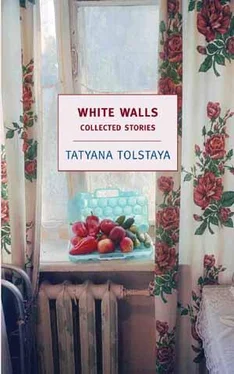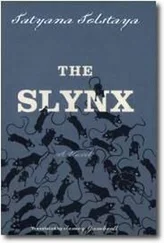There was a storm that night. The trees rioted. Lenechka woke up and cried. Morning was gray, sorrowful, windy. The rain knocked Sirin to the ground, and Grandfather sat up in bed and was fed broth. Petya hovered in the doorway, glad to see his grandfather, and looked out the window—the flowers drooped under the rain, and it smelled of autumn. They lit the stove; wearing hooded jackets, they carried wood from the shed. There was nothing to do outside. Lenechka sat down to draw, Uncle Borya paced, hands behind his back, and whistled.
The day was boring: they waited for lunch and then waited for dinner. Grandfather ate a hard-boiled egg. It rained again at night.
That night Petya wandered around underground passages, staircases, in subway tunnels; he couldn’t find the exit, kept changing trains: the trains traveled on ladders with the doors wide open and they passed through strange rooms filled with furniture; Petya had to get out, get outside, get up to where Lenechka and Grandfather were in danger: they forgot to shut the door, it was wide open, and the Sirin bird was walking up the creaking steps, its eyes shut; Petya’s schoolbag was in the way, but he needed it. How to get out? Where was the exit? How do I get upstairs? “You need a bill.” Of course, a bill to get out. There was the booth. Give me a bill. A treasury bill? Yes, yes, please! “Forging state treasury bills is punishable by law.” There they were, the bills: long, black sheets of paper. Wait, they have holes in them. That’s punishable by law. Give me some more. I don’t want to! The schoolbag opens, and long black bills, holes all over, fall out. Hurry, pick them up, quick, I’m being persecuted, they’ll catch me. They scatter all over the floor, Petya picks them up, stuffing them in any which way; the crowd separates, someone is being led through… He can’t get out of the way, so many bills, oh there it is, the horrible thing: they’re leading it by the arms, huge, howling like a siren, its purple gaping face upraised; it’s neither-fish-nor-fowl, it’s the end!
Petya jumped up with a pounding heart; it wasn’t light yet. Lenechka slept peacefully. He crept barefoot to Grandfather’s room, pushed the door—silence. The night light was on. The black oxygen pillows were in the corner. Grandfather lay with open eyes, hands clutching the blanket. He went over, feeling cold; guessing, he touched Grandfather’s hand and recoiled. Mama!
No, Mama will scream and be scared. Maybe it can still be fixed. Maybe Tamila can help?
Petya rushed to the exit—the door was wide open. He stuck his bare feet into rubber boots, put a hood over his head, and rattled down the steps. The rain had ended, but it still dripped from the trees. The sky was turning gray. He ran on legs that buckled and slipped in the mud. He pushed the veranda door. There was a strong waft of cold, stale smoke. Petya bumped into a small table: a jangle and rolling sound. He bent down, felt around, and froze: the ring with the toad, Tamila’s protection, was on the floor. There was noise in the bedroom. Petya flung open the door. There were two silhouettes in the dim light in the bed: Tamila’s tangled black hair on the pillow, her black robe on the chair; she turned and moaned. Uncle Borya sat up in bed, his beard up, his hair disheveled. Tossing the blanket over Tamila’s leg and covering his own legs, he blustered and shouted, peering into the dark: “Eh? Who is it? What is it? Eh!”
Petya started crying and shouted, trembling in horrible understanding, “Grandfather’s dead! Grandfather’s dead! Grandfather’s dead!”
Uncle Borya threw back the blanket and spat out horrible, snaking, inhuman words; Petya shuddered in sobs, and ran out blindly: boots in the flowerbeds; his soul was boiled like egg white hanging in clumps on the trees rushing toward him; sour sorrow filled his mouth and he reached the lake and fell down under the wet tree oozing rain; screeching, kicking his feet, he chased Uncle Borya’s horrible words, Uncle Borya’s horrible legs, from his mind.
He got used to it, quieted down, lay there. Drops fell on him from above. The dead lake, the dead forest: birds fell from the trees and lay feet up; the dead empty world was filled with gray thick oozing depression. Everything was a lie.
He felt something hard in his hand and unclenched his fist. The squashed silver guard toad popped its eyes at him.
The match box, radiating eternal longing, lay in his pocket.
The Sirin bird had suffocated Grandfather.
No one can escape his fate. It’s all true, child. That’s how it is.
He lay there a bit longer, wiped his face, and headed for the house.
Translated by Antonina W. Bouis
In 1948 Sergei’s mother-in-law’s karakul fur coat was swiped.
The fur coat, of course, was marvelous—curly, warm, with a rare lining: lilies of the valley embroidered in purple. You could stay in a coat like that forever: shoes on your feet, a muff on your hands, and just go, go, go! And the way they swiped it— brazenly, boorishly, crudely—just snatched it out from under her nose! His mother-in-law—a gorgeous creature, plucked eyebrows, heels clicking—went off to the flea market taking the cleaning woman Panya with her—you don’t remember her, Lenochka. No, Lenochka did remember her vaguely. Don’t be silly, weren’t you born in 1950? You’re confusing her with Klava, remember Klava, she had that pink comb and she was so round, remember? She kept saying, “My sins are great, my sins are great,” and kept worrying she’d burn in hell. But what a cook, and she taught me. And we used to give her our old shoes for her grandchildren in the village. Now no one takes old shoes, you don’t know what to do with them.
So anyway, she went with Panya. That Panya… His mother-in-law wanted to buy another fur coat, squirrel fur, for every day. A lady was selling one—a decent-looking woman, teary-eyed, with a blue nose; I can see her now… She had Panya hold the karakul, she put on the squirrel, turned around—the lady’s trail was cold and the karakul was gone. Panya, where’s the coat? A shriek, tears: Madame, I don’t know what happened, I was just holding it a second ago. They distracted my eyes, damn them! Well, who knows about her eyes, but couldn’t it have been a conspiracy? It was after the war, times were rough, there were all sorts of gangs around, and who really knew that Panya? And naturally the envy, the profound disapproval of people like his mother-in-law, Maria Maximovna, pretty, flashy, dressed warm and rich. And for what reason? You’d think they were living like birds of paradise, she and Pavel Antonovich, but nothing of the sort. Constant tension, anxiety, separations, night work. Pavel Antonovich was a military doctor, a warrior against the plague, an elderly man, complex, quick to judge; terrible in his wrath, and honest in his work. Here was an opportunity to look at a photograph of Pavel Antonovich, the way he was in the last years of his life, insulted, abandoned, wounded by the classic situation: his students moved on, taking the most precious of their teacher’s work, carrying the slightly soiled banner onward without honoring the founder with a single line or a single footnote.
Sergei raised his eyes on high and made out, high on the wall, in the warm silky shadows, a pair of glasses, a mustache—
Lenochka, do you remember Papa? Of course. Maria Maximovna went to the kitchen to get sweet rolls, Sergei leaned over to pat Lenochka’s hand; she offered it to him as if it were an object and explained that actually she barely remembered her father and had only said that for Mother’s sake—She remembered the settled March snow, full of holes, the lacquered shine of the car, and how it smelled inside, and the chauffeur’s steel teeth, his cap… The cloud of her father’s cologne, the creak of the seat, his angry nape, and the naked trees flashing past the window—they were going somewhere… And another day— May, golden, with a harsh sweet wind coming through the window, and the apartment upside down, either the carpets being sent to the cleaners or the winter things being put away in mothballs, everything shifted, people running back and forth. And Pavel Antonovich’s wrathful horrible shout in the hallway, thumping footsteps on the floor; he throws something heavy, bursts into the room, and powerful and red, he pushes through, trampling the teddy bear, trampling the doll’s tea, and the May sun was indignant, shaking and splashing from the lenses of his glasses. The reason was trifling—the dog might have made a mess near the door. But in fact the dog was nothing, an excuse, it was just that life had begun to turn its not-good side toward Pavel Antonovich. And they didn’t have anything to drive in, anymore.
Читать дальше












